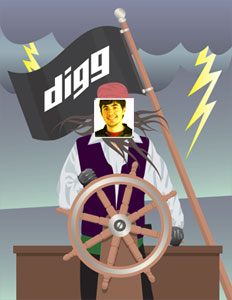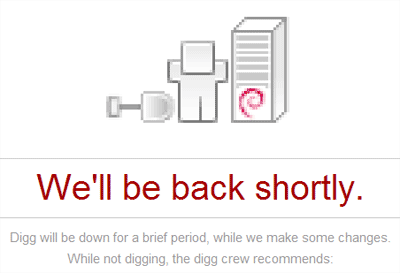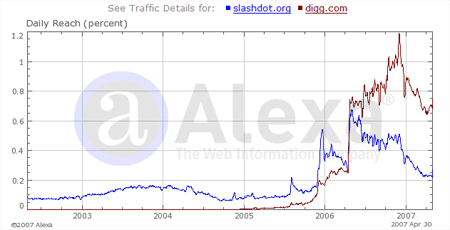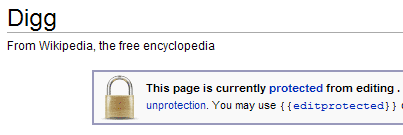Mayday, mayday! The tale of Digg’s perfect storm and the pirate captain Kevin Rose

May Day 2007 started out as a typical day at Digg. Hordes of diggers were recommending tales of Ubuntu, Apple and Wii. Weary search marketers were cursing as usual at seeing their perfectly legitimate pieces of diggbait buried by mysterious hands.
Then all of a sudden it hit – the perfect storm.
Somehow, a 32-digit hexadecimal number leaked out onto the Internet. But this wasn’t any number, it was a silver bullet that could take down the evil MPAA and the RIAA. This number was a code. This code could to defeat the copy protection on the HD-DVD that had been produced to date.
News doesn’t travel much faster than this. The original article with the code achieved thousands of diggs in a short few hours, rocketing it to the Digg home page.
Then the article was censored and the original submitter banned. Apparently, Digg had been contacted by lawyers demanding that they remove all mention of the code under intellectual property laws.
A new article shot up to the homepage complaining about the censorship and reposting the code. It too was censored.
 All hell broke loose. Digg’s core users posted story after story with the code embedded in the headlines and story summaries. They found many clever excuses to mention the number.
All hell broke loose. Digg’s core users posted story after story with the code embedded in the headlines and story summaries. They found many clever excuses to mention the number.
People dugg and dugg and dugg these stories. Plus, they buried every single story they could find that didn’t have anything to do with the illicit code.
The result was that essentially the entire site had been hijacked. Digg couldn’t delete stories fast enough. They were losing control, and ultimately had to take the site down.

It was a May Day protest fitting for our digital century. The content producers were on strike.
Amidst the scent of mutiny, Digg was sinking.

Kevin Rose knows who butters his bread
Kevin Rose, watching his tens of millions literally evaporate overnight, did an amazing job of crisis management. He had two general options:
- Shut down the site for a few days, and let things cool off. When the stock market is in a rapid downswing, they suspend trading until cooler heads prevailed.
- Give in.
He chose to give in with a bit of a twist. He didn’t throw in the towel – he realized that his best option was to grab his cutlass and hoist his pirate flag with his fellow Diggers.

He posted the code himself and essentially pledged to lead the fight.
This was crisis management at its best. The die was cast, and Rose knew it. His only choice to avoid a total social implosion of Digg was to become the leader of the movement. Anything less than this and his reputation would have been near-permanently tarnished amongst his most loyal user base.
This will be the biggest individual test of copyright law versus online freedom of speech that we’ve had to date. I’m not sure if there are enough lawyers to file all the DMCA requests that will need to be made to try to squash this.
This battle was coming, and there is probably no better person to lead it.
His actions appeased the Digg collective and things began to quiet down and return to normal.
This is a landmark day in social media and in the history of the Internet
 In twenty years, when a completely new generation writes the history of the Internet – this event will be regarded as a turning point. This was the day that social media flexed its muscles and became a true force for change.
In twenty years, when a completely new generation writes the history of the Internet – this event will be regarded as a turning point. This was the day that social media flexed its muscles and became a true force for change.
Digg is arguably one of the top 10 most influential sources of website traffic on the Internet. In one day, their entire enterprise almost sank in a Titanic fashion.
Why did this happen?
I can’t think of a more perfect storm for Digg to have endured.
- The code was so small it was easy to post in headlines and summaries.
- Their core users are fundamentally anti-censorship.
- They hate the MPAA-RIAA and their copy-protection schemes with a passion usually reserved for Microsoft.
- They have strong ties with one another, encouraged by the feature set in Digg’s system.
- …and they are subversive by nature – they aren’t going to hang out in a place that kisses up to the powers that be.
Digg became a victim of their own subculture.
The nightclub theory
Kevin faced what I like to think of as the “nightclub theory” in social media. Essentially, a nightclub can only survive as long as its customers can maintain a sense of “possessiveness” of the club and a notion of “exclusivity” amongst themselves.
Both of these were under attack as Digg began heavily censoring and banning users.
Also, a nightclub needs to retain the “cool” factor. One sure way to lose it amongst the user base is for Digg to sell them out to the evildoers behind the copy-protection schemes.
It doesn’t take much for it to slip away. Look at how Digg’s rise coincides with the decline of Slashdot. Both sites share the same subculture but Digg has it all over Slashdot in terms of “cool.”

THE FALLOUT
Let’s look at some of the fallout from this…
Kevin Rose had his whole site buried
Kevin Rose got a chance to get spanked big-time by the bury button. Every legitimate article on Digg was buried in the protest. Without the bury feature it is unlikely a mob could have succeeded at shifting the content of the entire Digg site in such a profound fashion.
Expect some super-subtle changes to defang the bury button a few months down the road – assuming that the courts haven’t ordered Digg’s servers to be confiscated by then.
Users prove in force that their content is king and they call the shots in social media
Digg has created a powerful social architecture. However, it is the users that have provided the real value – all estimated $100 million of it. Digg-style sites using the open source Pligg software are sprouting up everywhere. Digg knows that their market advantage isn’t etched in stone and as witnessed here it can slip out overnight.
Digg is a pretty good breaking news site after all!
The speed that the code originally made it to the home page suggests that Digg actually can serve as a breaking news site after all – as long as the topic is technical and subversive.
Wikipedia falls flat on this one
Unlike with the coverage of the tragic spree killing at Virginia Tech, the same event that had caused Digg some flack for slow response, Wikipedia wasn’t reporting any news of the event in their Digg article whatsoever. They froze the article, preventing it from being edited.

This shows that Wikipedia does not work that well with breaking news if the event at hand is highly charged and controversial.
How can the MPAA and the RIAA be so stupid as to try to put a broken egg back together?
I honestly don’t know. As AOL and many others have learned – once something is out on the Internet it is there to stay. Why not acknowledge it as futile and at least try to turn it into some kind of positive PR?
History teaches us that technology and market forces cannot be stopped.
How big a hole do they really want to digg for themselves?
UPDATE: A few interesting takes:
- Graywolf thinks that pragmatism will end up ruling the day
- Danny Sullivan has all the nitty gritty details
- Duncan Riley thinks that this should be a warning to avoid corporate arrogance in Web 2.0 companies
- MG Siegler catches the May Day irony as well.
UPDATE #2: A couple more:
- Andy Beal ponders about where things will go from here. I think that the community will become even more loyal to Digg. Kevin Rose has his street cred back, but I think that he’s going to try to implement some “new features” to try to make this kind of mutiny much harder to pull off.
- Neil Patel uses this all to rail against the anonymity of Digg’s bury feature, calling it undemocratic. I’ve read his post twice and am still not sure where he is coming from here as anonymity and democracy are not mutually exclusive. There are pluses and minuses when it comes to anonymity in a social setting. I’m betting that now that Kevin Rose has seen the destructive power of the bury feature first hand he begins to restrict the number of individual buries that are allowed per person, perhaps on a sliding scale.
- Download Squad concurs with the importance of all this offers up this great quote from Joe Rogan on the old show Newsradio – “Dude, you can’t take something off the Internet.. that’s like trying to take pee out of a swimming pool.” Ah, but watch the MPAA try…
